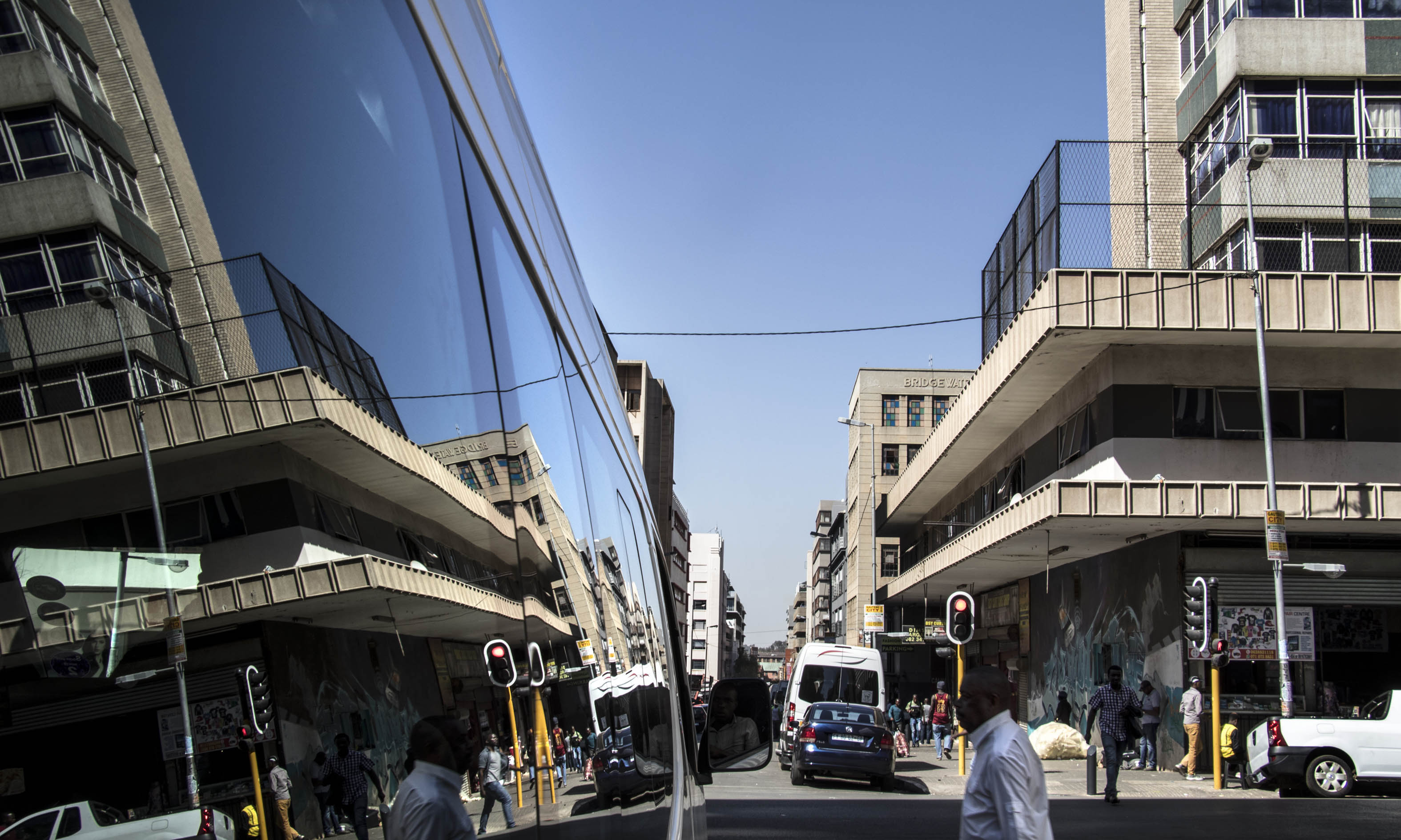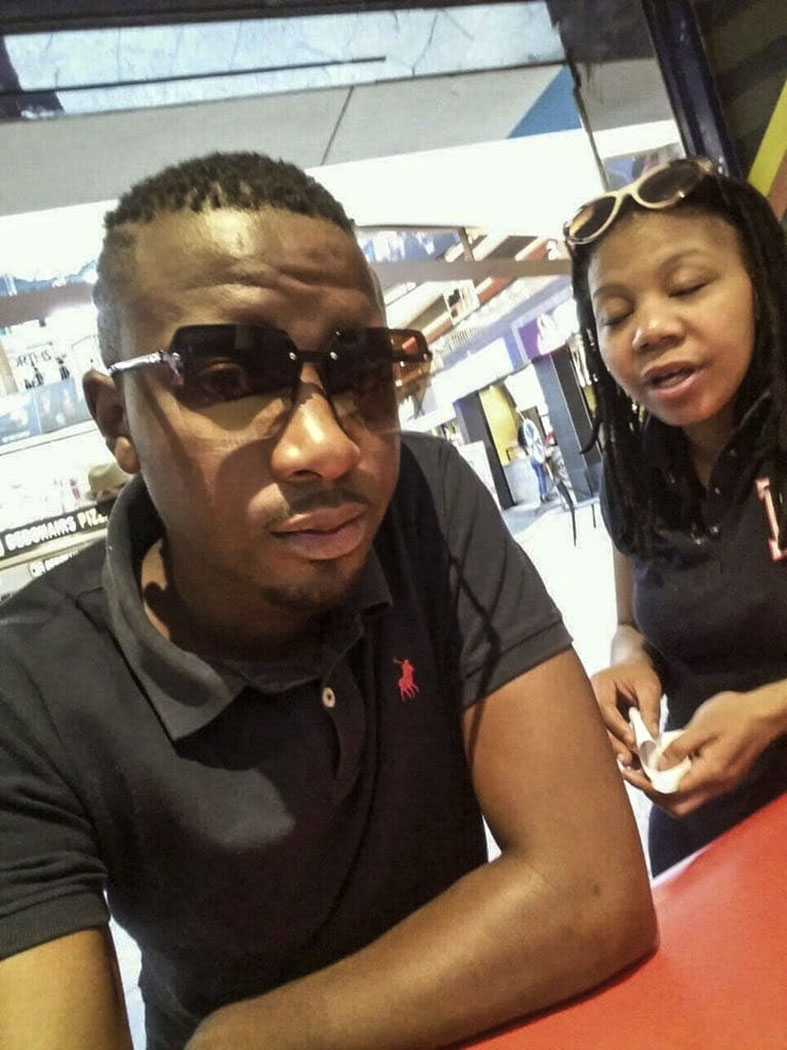Empty: Mpho Thobane appeared in court 9 in Johannesburg Central magistrates court on a charge of murder. The arson charge has been dropped for lack of evidence.(eNCA)
The first thing you notice about proceedings at court 9 in the Johannesburg Central magistrate’s court is how unsettlingly quiet it is.
There is hardly anyone in the public gallery. Of the few there, too many turn out to be accused persons in some or other petty crime, out on bail and instructed to present themselves at court 9 at 8am. They sit, they wait, neatly dressed but inconspicuous, one or two occasionally wearing the look all of us have when we have begun to ask ourselves how it is we ever got here.
They watch the procession of postponements and motions that the magistrate, prosecutor, assessors and defence attorney spend their time on for seemingly the entire morning, waiting for their turn to come. When it does, they are given another date to come back, as the state “finalises” its case. And as these unfortunates gradually empty the room, you realise that there are none of the cast of characters you would expect to see, given what is about to unfold in this small wood-panelled room in downtown Johannesburg.
There are no journalists, no protesters, no activists, no support groups, no family. Nobody’s outside burning impepho for either the victim or the accused, as we have become accustomed to seeing in the trials of more famous offenders.
All of this is somewhat strange, because court 9 is the setting for the trial of a young man accused of committing one of the most shocking acts of femicide in a country no longer shocked by the killing of women. It is in this courtroom where Mpho Thobane is the sole murder accused in the 2018 death of Viwe Dalingozi, his girlfriend at the time. Thobane, the state alleges, set her on fire while she slept in her bachelor flat at Fashion Lofts in downtown Johannesburg. He then fled to his hometown of Mokopane in Limpopo, where he would be apprehended by police days later and returned to the city. He was denied bail and has been in police custody since.

Crime scene: Viwe Dalingozi lived and was burned in her flat in the Fashion Lofts building on Pritchard Street in downtown Johannesburg. (Ali Greeff)
Eventually, at 11.57am, the magistrate calls case number 41/2102/2018, and the orderly brings Thobane up into the courtroom from the holding cells beneath. He is neat and well-presented, even handsome. His haircut looks fresh. He does not initially look at the public gallery. Perhaps having been here several times since his first appearance in November, he knows not to expect anyone to be there to support him. But later, when he leaves the stand, he does cast his eyes up briefly and scans the room. But there is no one. No sympathetic family eyes look back at him or reassure him that all will be fine. No one heckles or shouts “Monster!”

Torched: Mpho Thobane and Viwe Dalingozi pictured together. The 31-year-old from the Eastern Cape died of severe burns two days after she was allegedly set alight by Thobane in November last year. (Supplied)
This trial takes place in a quiet vacuum, outside the glare of media and commentators, without the presence of gender-based violence activists, and in the absence of the victim’s family, hundreds of kilometres away in the Eastern Cape.
Perhaps because of these absences and this silence, too much has gone wrong with the case. It is not possible to listen to the trial of Thobane and not lose hope of justice being found for Viwe. The investigation and the prosecution are a litany of errors, missed opportunities and appalling amounts of negligence.
Last November, with the country still transfixed by the macabre nature of Viwe’s death, the cameras were there for his first appearance in court, where he faced charges of arson and murder. This made sense: the state’s assertion was that he set his girlfriend alight, and by so doing burnt down her flat and parts of a neighbour’s home, and that she subsequently died from her fire-related injuries.
Now, he is answering only to the murder charge. Arson had to be dropped from the charge sheet because the police never established a link between him and the fire that ended Viwe’s life. The official report on the cause of the fire reads “undetermined”. The initial allegation was that Thobane left the building and went to a garage to buy petrol, which he doused his victim with and set her alight. In the chaos of those harrowing, murderous moments, he too sustained burns to his arms and torso, and had these injuries on him when he was arrested in Limpopo days later — or so the state said.
But the arresting officers and their colleagues at the holding cells in Johannesburg failed between them to take pictures, or any other record, of his wounds. He was not taken to hospital or attended to by a medical officer, which would have left a paper trail of his injuries. In fact, the record of arrest categorically states that there was nothing wrong with him when he was booked in at Johannesburg Central police station.
The only record of his burns was in the statement submitted by the lead investigating officer, which is contradicted by the arrest report and is not backed up by the two colleagues who assisted in the arrest. They made no statements.
The effect of all this is to render it near impossible to prove that Thobane was on the scene when the fire started.
To prove his complicity, the state has had to rely on the evidence of one of the security guards at Fashion Lofts, who testified to the fact that Thobane left the building in the evening and must have returned, because the guard saw him leaving again a short while later. As Thobane was leaving the second time, the security guard’s colleague ran in to tell him that a fire had broken out on the 9th floor, where Viwe’s flat was. But if he did return with a container of fuel, this was not seen by anyone or testified to in court.
Perhaps most egregiously, the police do not seem to have interviewed anyone working at garages in the vicinity to determine whether their prime suspect bought petrol from them that night. They also did not obtain forecourt footage that might have shown the suspect buying the murder weapon.
Poor handling of the physical evidence is only one part of the story of police incompetence that marks this case. The witnesses have been shockingly handled. We have already established that no petrol attendants were interviewed, but the state also has no witnesses from the building — no neighbours with gossipy but illuminating stories to tell about the young couple at number 910, nobody to say whether they fought or argued loudly that fateful night.
How this came to be is not clear, but it may not be the result of witnesses not being eager to come forward. There is the archetypal case of Thuli*, the neighbour who, according to the legend of this case, was the only person who opened her door to Viwe when she desperately looked for help. Thuli has told her story to Viwe’s friends and family and repeated to them her willingness to stand in court and testify to what she heard and saw.
What she says she heard and saw was something she will probably never forget. On the night of October 25 2018, she opened her door to desperate screams and was greeted by the grisly sight of a woman covered only in her underwear, smoke and embers.
It was Thuli who called the authorities and gave Viwe her cell phone, from which the latter made a heart-breaking call to her uncle: “Malume, nditshisiwe. Ndiyoyika. Ndizakufa [Uncle, I have been set alight. I’m scared. I’m going to die].”
But Thuli is not on the state’s witness list. Why this is so has proved hard to determine, even after speaking to the lead prosecutor about it.
Thuli is in regular contact with the uncle, to whom she has repeated the story and who believes her. From his home hundreds of kilometres away he regularly passes on her phone numbers, wondering aloud why she is not due to be called to tell the story of his niece’s brutal death from her vantage point. But she never spoke to the police, or the police never spoke to her. Whichever is true, there is no statement from her in the case docket. So she cannot be called to the witness stand, as she seems to want to be and Viwe’s uncle is pressing for.
“Where was she?” asks the prosecutor, exasperated and defeated. “Where was she when this man …” — he shakes a finger at the elfin figure of the investigating constable sitting in a corner of the room, a man whose distinguishing feature seems to be his ability to cower and all but disappear from view — “went knocking from door to door asking all of them to come forward? You know what they said? ‘I don’t want to get involved.’ ”
We are in his cramped office in another wing of the courthouse, during a postponement the magistrate has granted to allow him to contact and bring a crucial state witness to court. As he says this he throws his hands up and turns his face in a posture of mock disinterest.
This may be true. After all, it is a reality that criminals prosper because few want to speak up about what they see and hear. Or it may be the story the police told the prosecutor to explain the incredible paucity of witnesses to such an extraordinary event. That the police may have failed in their most basic duties, then lied to cover up the failure, seems a more plausible scenario than the alternative: the only person who opened her door to a dying Viwe, called for help and then gave her the phone to speak to her family for the very last time somehow decided she “didn’t want to get involved” when the police came knocking.
There are other, even more shocking lapses in the marshalling and preparation of witnesses. One particularly stands out, although that story cannot be told until it finally resolves itself, and hopefully in a way that allows Viwe’s family and friends to find peace, and possibly even justice.
Whether it does or not, the net effect of all these blunders is that they have left gaping holes in the story of how and why Viwe Dalingozi died, holes big enough for an accused murderer to walk right through.
Thobane returns to court again on October 17.
* Not her real name